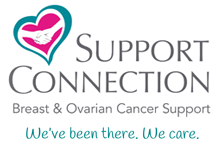By Denise Rodman, Support Connection Peer Counselor
Fear, anxiety, sadness, and anger are all common emotions felt by people dealing with cancer. Finding a way to express these emotions can be challenging. We often hide our true emotions to avoid worrying friends, family, and even our employers. Instead, these emotions can take hold in our minds and become very overwhelming.
What if there was a way to share these emotions in a safe place with others who are having similar experiences? That safe place could be a Support Connection support group.
Benefits of support groups
The National Cancer Institute website shares much useful information about coping with cancer. For example, this article focuses on the benefits of support groups. It lists some of the ways support group participation can enhance quality of life, such as:
- Help you feel better, more hopeful, and not so alone
- Give you a chance to talk about your feelings and work through them
- Help you deal with practical problems, such as problems at work or school
- Help you cope with side effects of treatment
I recently asked our support group facilitators about the value and benefits they observe in the groups they lead for us. Here are some insights they shared:
- What I learned is that women who attend our groups are committed to each other despite their struggles.
- Confidentially of our support groups allows our attendees to share their stories with confidence.
- Cancer is hard to talk about and support groups offers a safe place.
- Every support group is different, and every meeting is different.
- The most rewarding part is watching a scared woman come to their first few groups tearful and upset, and over time they become the ones helping new members that need encouragement.
Take a test drive!

Personally, I have attended my fair share of support groups. One lesson I’ve learned is this: You need to find the right group for you. Support groups are not “one-size-fits-all.” If you’ve tried a group in the past and got the feeling it wasn’t for you, there might be different group that fits your needs.
Think of it as a test drive. And you can take a few test drives until you find what you want and what works for you. There isn’t a right or wrong way to find support. You just need to take the leap. When you find the right group, it can feel like a lightbulb going off.
Where your test drive can take you
Hearing someone else share how they’re feeling allows you to process emotions, feel connected, and lessens the feeling that you’re the only one who feels a certain way. In the beginning you may feel like a stranger to the other group members. But, as you share and listen, these group members become confidants. There is no judgement. Everyone understands where you’re coming from. Group members offer one another coping strategies, encouragement, and in some instances, hope.
While some women prefer to talk, others prefer to listen. Hearing from others who have been there, who are going through challenges, managing side effects, making difficult decisions, processing feelings and concerns, venting their frustrations, can help you feel connected and understood.
What you need to know to step into the driver’s seat
Support Connection offers a variety of groups throughout the year. They are led by facilitators who are cancer survivors themselves. And they are confidential. What happens in group stays in group.
If you’re interested in trying one of our monthly support groups, take a look at the list on our website. We also have topic-focused Open Discussions. Some of these meet just once, but many of them meet at regular intervals throughout the year, offering another avenue for group support.
When you find a group that fits into your schedule that you’d like to register for, or if you have any questions about our groups, call to speak with one of the Peer Counselors on our staff. They’ll be happy to help! Call 800-532-4290 or 914-962-6402.
